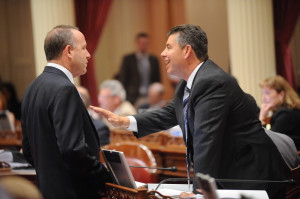
Steinberg will be affected by Proposition 28 if passed.
Proposition 28 is on the ballot for June 5 and looks to restrict the amount of a time a person may serve in the California State Legislature.
If passed, this state constitutional amendment would reduce the amount of potential time served in either the Senate or State Assembly of the office from 14 years to 12 years, but only takes effect on elected legislators after the measure has been passed.
Our current system allows a person to serve in the Senate for two terms consisting of four years each, and in the Assembly for three terms lasting two years each. Proposition 28 would limit the total years to 12, but would allow a person to serve up to three terms in the Senate or up to six years in the Assembly, or any combination within the 12-year limit.
Supporters of Proposition 28 call it “a fresh start for term limits.” They say it will close a loophole which allows politicians to serve 17 years in Legislature.
The loophole works by allowing politicians to fill partial term vacancies in State Legislature and not have it count against their current 14-year limit. Currently if a legislator takes over office and serves one day under half a term it does not count against their allotted service time.
Gabriel Sanchez is the spokesmen for Californians for a Fresh Start, and noted that Proposition 28 would not be applicable to current and former legislators to prevent them from extending their lifetime limits preventing further loopholes.
“Current law is designed for terms and this limits the amount of time in office to 12 years period,” says Sanchez. “Current legislators are stuck on the old limits until they are done.”
Those in opposition of Proposition 28 call it a “scam” and point out the substantial increase of potential time in the Senate or State Assembly.
“This measure actually allows every member of the State Assembly to double their time in office,” says Scott Loenhorst, who runs 28no.org, the “No on 28” campaign website. “Term limits are so popular with the voters that the only way to try and pass a weakening of them is to actually fool the voters into thinking that this measure does the opposite of what it purports to do.”
The opposition claims this proposition was written in an attempt to fool voters with tricky wording to overturn the previous outcomes with term limit reforms.
“If we want to have fair and honest discussion about term limits, it is imperative that the ballot title and summary of Prop. 28 reflect what is actually going to happen if it is passed,” says Loenhorst. “Polling and past elections show that California voter do not want to extend term limits, and that they actually want them shorter.”
The recent trend from voters has shown they are against lengthening term limits, similar propositions have been defeated in the past. Proposition 45 was defeated in 2002, and Proposition 93 was defeated in 2008, both attempted to lengthen terms in a single office.
Supporters believe that putting a hard limit on years spent will encourage politicians to focus more on their work than on staying in office.
“Proposition 28 prevents the merry-go-round that is happening now with politicians in office,” says Sanchez. “Too many are focused on campaigning and this will help stop that and allow law makers to focus on the work at hand.”
“Sacramento special interests are desperate now,” says Loenhorst. “Voters have rejected all four attempts to go after term limits since they were passed in 1990.”











